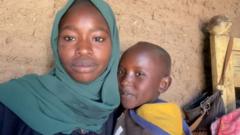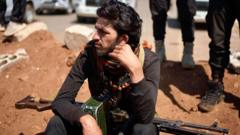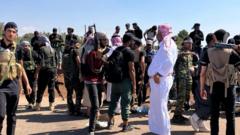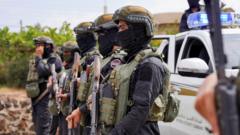An attacker affiliated with Islamic State killed at least 20 people during a church service in Damascus, reminding the public of the country’s ongoing sectarian tensions and security challenges.
Suicide Bombing Strikes Church in Damascus, Killing 20

Suicide Bombing Strikes Church in Damascus, Killing 20
A tragic attack highlights the volatile security situation in Syria as new government struggles for stability.
On Sunday, a suicide bomber targeted the Mar Elias Church in Dweila, a district of Damascus, resulting in a horrifying scene as worshippers were caught off guard during the Greek Orthodox service. This marked the first suicide bombing in the capital since the ousting of President Bashar al-Assad in December, after more than a decade of civil war.
According to Syrian authorities, the assailant began shooting at congregants before detonating an explosive vest, leading to at least 50 additional injuries. The attack was attributed to suspected links to the Islamic State, an extremist group which previously held significant territories in Syria. This incident raises questions about the new administration's ability to ensure safety and quell sectarian violence, especially towards religious minorities.
In response to growing concerns, officials from the United Nations and the United States have warned that remnants of the Islamic State are likely attempting to exploit the power vacuum following Assad's downfall. The Syrian government claims to have intercepted several foiled attack plans targeting Christian sites in recent months.
Eyewitness accounts from the attack described chaos, with ambulances and civilians rushing to assist those affected. Photos released by state media depicted the damage inside the church, showcasing blood-stained floors and debris scattered throughout. The incident serves as a stark reminder of the ongoing threat to security and stability in a country still reeling from the long-lasting impacts of civil conflict.
According to Syrian authorities, the assailant began shooting at congregants before detonating an explosive vest, leading to at least 50 additional injuries. The attack was attributed to suspected links to the Islamic State, an extremist group which previously held significant territories in Syria. This incident raises questions about the new administration's ability to ensure safety and quell sectarian violence, especially towards religious minorities.
In response to growing concerns, officials from the United Nations and the United States have warned that remnants of the Islamic State are likely attempting to exploit the power vacuum following Assad's downfall. The Syrian government claims to have intercepted several foiled attack plans targeting Christian sites in recent months.
Eyewitness accounts from the attack described chaos, with ambulances and civilians rushing to assist those affected. Photos released by state media depicted the damage inside the church, showcasing blood-stained floors and debris scattered throughout. The incident serves as a stark reminder of the ongoing threat to security and stability in a country still reeling from the long-lasting impacts of civil conflict.



















